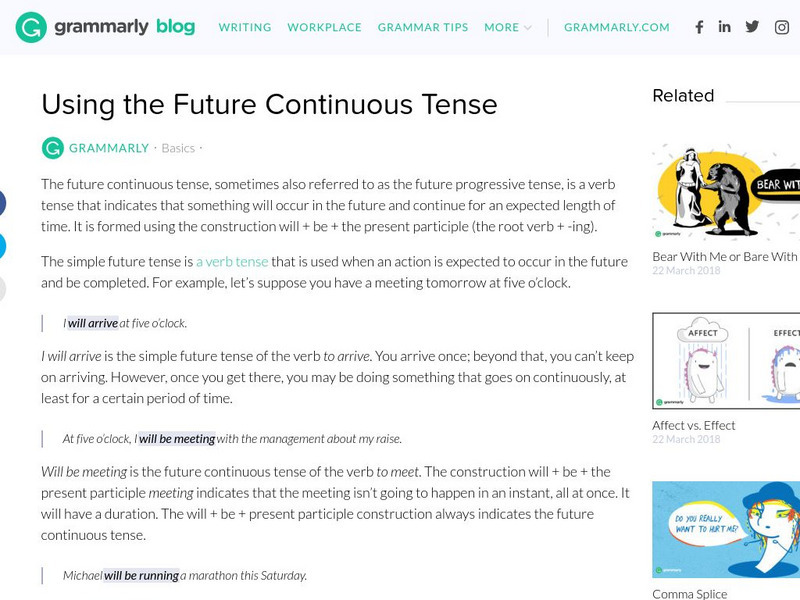Grammarly
Grammarly Blog: Comma Use Around Interrupters
This page focuses on the need for commas around interrupters in sentences and provides examples. Common interrupters include in fact, to say the least, however, generally speaking, sadly, happily, and unfortunately. Nouns of address can...
Grammarly
Grammarly Blog: Subjunctive Mood
An explanation and examples of writing in subjective mood.
Grammarly
Grammarly Blog: Indefinite Article With a Plural Noun
An explanation with examples of the proper use of articles with plural nouns.
Grammarly
Grammarly Blog: Possessive Pronouns: Rules and Examples
An explanation with examples of possessive pronouns and how they are used in sentences.
Grammarly
Grammarly Blog: Common Errors in English: Bad or Badly
This Grammarly Handbook resource clarifies the difference in usage between "bad" and "badly" in sentences. Numerous examples are provided in this resource.
Grammarly
Grammarly Blog: End of Sentence Punctuation
This page discusses end of sentence punctuation with links to periods, exclamation marks, and question marks.
Grammarly
Grammarly Blog: Types of Quotes
Notes and examples explaining different types of quotes including: direct, indirect, short, long, and numbers.
Grammarly
Grammarly Blog: Capitalization: Family Relationships (Used as Proper Names)
This page explains that family relationships such as Mom, Dad, Uncle, and Aunt are capitalized if they are used as names, but are not capitalized if used as common nouns such as my mom, his dad, etc. Examples are provided.
Grammarly
Grammarly Blog: Nouns
This page focuses on nouns including definitions, types of nouns (person, place, thing/idea), common vs proper nouns, types of common nouns (concrete, abstract, collective), nouns as subjects, nouns as objects, nouns as subjective and...
Grammarly
Grammarly Blog: Possessive Nouns
An explanation with examples of possessive nouns and their use of apostrophe.
Grammarly
Grammarly Blog: Misuse of Like and As
An explanation with examples of using the words "like" and "as" correctly in sentences.
Grammarly
Grammarly Blog: Sentence Emphasis
An explanation and examples of various techniques that can be used in order to emphasize important sentences within a text.
Grammarly
Grammarly Blog: Negatives
An explanation and examples of negative words and how they affect a sentence.
Grammarly
Grammarly Blog: When Should I Spell Out Numbers?
This page focuses on when to write figures and numbers in writing; it provides the rules for both general writing and for technical, scientific, and complex writing. Examples are provided.
Grammarly
Grammarly Blog: Past Perfect Continuous (Past Perfect Progressive) Tense
An explanation with examples of past perfect progressive verb tense in sentences.
Grammarly
Grammarly Blog: Countable and Uncountable Nouns
This Grammarly Handbook resource clarifies the difference between countable and uncountable nouns. Examples of countable and uncountable nouns are provided.
Grammarly
Grammarly Blog: Countable and Uncountable Nouns With Adjectives
This Grammarly Handbook resource clarifies the difference in usage between countable and uncountable nouns in sentences. Numerous examples are provided in this resource.
Grammarly
Grammarly Blog: Conditional Sentences. Main Clause: Will, if Clause: Will
This Grammarly Handbook resource clarifies the topic of conditional sentences. In this resource, a main clause with the word "will" and a dependent clause with a future tense verb, along with the word "if" as a subordinate conjunction,...
Grammarly
Grammarly Blog: Compound Words
This Grammarly Handbook resource provides information about how to interpret the meanings of compound words and how to use them correctly in writing. Examples are provided with different types of compound words: open compound words,...
Grammarly
Grammarly Blog: Closed Compound Words
This page explains closed compound words, one word compounds formed by two words, and provides examples.
Grammarly
Grammarly Blog: Italics and Underlining: Names Ships and Trains
An explanation and examples using italics/underlining when writing the names of spacecraft, aircraft, ships, and trains.
Grammarly
Grammarly Blog: Using the Future Continuous Tense
This page explains what future continuous (progressive) tense means and how it is formed and provides examples.

























